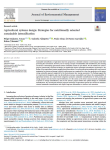Dalzotto Artuzo F., Allegretti G., de Faccio Carvalho P.C., Talamini E. (2025). Agricultural systems design: strategies for nutritionally oriented sustainable intensification. Journal of Environmental Management, 01/05/2025, vol. 381, p. 125253.
https://doi.org/10.1016/j.jenvman.2025.125253
https://doi.org/10.1016/j.jenvman.2025.125253
| Titre : | Agricultural systems design: strategies for nutritionally oriented sustainable intensification (2025) |
| Auteurs : | F. Dalzotto Artuzo ; G. Allegretti ; P.C. de Faccio Carvalho ; E. Talamini |
| Type de document : | Article |
| Dans : | Journal of Environmental Management (vol. 381, May 2025) |
| Article en page(s) : | p. 125253 |
| Langues : | Anglais |
| Langues du résumé : | Anglais |
| Catégories : |
Catégories principales 06 - AGRICULTURE. FORÊTS. PÊCHES ; 6.4 - Production Agricole. Système de ProductionThésaurus IAMM SYSTEME DE PRODUCTION ; DURABILITE ; INTENSIFICATION ; NUTRITION HUMAINE ; REGENERATION |
| Mots-clés: | AGRICULTURE REGENERATRICE |
| Résumé : | Sustainable intensification of agriculture has been proposed as a desirable solution to meet human needs while protecting the environment. However, due to varying concepts of sustainability and intensification, the meaning and means of intensifying agricultural systems sustainably remain an open debate. We ask whether the system's purpose (nutritionally oriented) and design can significantly impact sustainable intensification performance. The design of four agricultural systems ranging from monoculture to crop diversification gradients and crop-livestock integration for protein and energy (calories) reinforcement are compared for a four-year production cycle using a strong sustainable approach supported by the thermodynamic law: emergy assessment. The findings suggest that (i) crop-livestock integration and crop diversification increase renewability and reduce the unsustainability of agricultural systems; (ii) crop-livestock integration promotes sustainable intensification for both protein and energy purposes; (iii) increased crop diversification over the system cycle doesn't mean increased sustainability of protein or energy intensification, and (iv) the system's purpose defines the optimal design for sustainable intensification. We conclude that both the purposes and design of agricultural systems are relevant for nutrition-oriented sustainable intensification and require long-term assessments to reinforce such assertions. |
| Cote : | Réservé lecteur CIHEAM |
| URL / DOI : | https://doi.org/10.1016/j.jenvman.2025.125253 |







